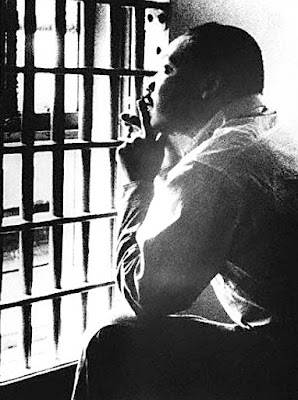Martin Luther King Jr. in Birmingham City Jail
Snippets
from MLK’s “Letter from Birmingham Jail”: Thoughts for Canada’s trucker protest
By Hendrik van der Breggen
February 11, 2022
Dr. Martin Luther King Jr. (1929-1968) wrote his now-famous “Letter from Birmingham Jail” in 1963. It was a response to critics of his peaceful protests in the U.S. against racism and racial segregation. If there is a document that should be consulted about civil disobedience, MLK’s letter would be it.
Today I was re-reading MLK’s letter, hoping to get some insights into Canada’s trucker protest. Below are some snippets that stood out to me. Whether the reader supports the trucker protest or not, I think MLK’s letter can help us.
Note: I am not saying the COVID-19 mandates are analogous to the horrors of the racism that MLK faced; they aren’t. Rather, I am saying the truckers who are protesting against the injustices of COVID restrictions (I believe there are and have been real injustices) and the critics of such protests—both sides can learn from MLK’s letter. In my view: (a) truckers should heed MLK’s call to remain peaceful and act justly even in the face of vilification (as they have been, as far as I can tell) and even if the state flexes its muscles and resorts to police force (as seems imminent); and (b) persons with political power should heed MLK’s call to listen and negotiate (are you listening, Prime Minister Justin Trudeau?).
Snippets from Martin Luther King Jr.’s “Letter from Birmingham Jail” (written to fellow clergymen who had publicly expressed criticism of his work):
You deplore the demonstrations that are presently taking place in Birmingham. But I am sorry that your statement did not express a similar concern for the conditions that brought the demonstrations into being.
You may well ask, "Why direct action, why sit-ins, marches, and so forth? Isn't negotiation a better path?" You are exactly right in your call for negotiation. Indeed, this is the purpose of direct action. Nonviolent direct action seeks to create such a crisis and establish such creative tension that a community that has consistently refused to negotiate is forced to confront the issue. It seeks so to dramatize the issue that it can no longer be ignored. … So, the purpose of direct action is to create a situation so crisis-packed that it will inevitably open the door to negotiation.
We know through painful experience that freedom is never voluntarily given by the oppressor; it must be demanded by the oppressed. Frankly, I have never yet engaged in a direct-action movement that was "well timed" according to the timetable of those who have not suffered unduly from the disease of segregation.
[T]here are two types of laws: there are just laws, and there are unjust laws. I would agree with St. Augustine that "An unjust law is no law at all." … Any law that degrades human personality is unjust. All segregation statutes are unjust because segregation distorts the soul and damages the personality. It gives the segregator a false sense of superiority and the segregated a false sense of inferiority.
I hope you are able to see the distinction I am trying to point out. In no sense do I advocate evading or defying the law, as would the rabid segregationist. That would lead to anarchy. One who breaks an unjust law must do so openly, lovingly, and with a willingness to accept the penalty. I submit that an individual who breaks a law that conscience tells him is unjust, and who willingly accepts the penalty of imprisonment in order to arouse the conscience of the community over its injustice, is in reality expressing the highest respect for law.
Like a boil that can never be cured so long as it is covered up but must be opened with all its ugliness to the natural medicines of air and light, injustice must be exposed, with all the tension its exposure creates, to the light of human conscience and the air of national opinion before it can be cured.
I have consistently preached that nonviolence demands that the means we use must be as pure as the ends we seek.
Hendrik van der Breggen, PhD, is a retired philosopher who lives in Steinbach, Manitoba, Canada.
Hendrik’s articles relating to COVID
- Vaccine mandate propaganda?
- Does Canada’s federal government want to destroy Canadians? What happened to the ethical dimensions of public policy?
- Reframing the Covid-19 scapegoat: Trudeau is the culprit. Why wasn't Canada’s health care system built up enough to withstand being overwhelmed?
- We need some healthy scepticism about science and medicine. ‘Follow the science’ is not a scientific attitude
- ‘Those who torment us for our own good will torment us without end’: Fallible thoughts about Covid-19 vaccination from an old and tired (and retired) Canadian philosopher
- Let’s wage a Just War on COVID

No comments:
Post a Comment